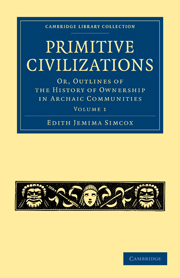Book contents
- Frontmatter
- PREFACE
- Contents
- CHAPTER 1 INTRODUCTION
- CHAPTER II PREHISTORIC PROBLEMS
- BOOK I OWNERSHIP IN EGYPT
- BOOK II ANCIENT BABYLONIA
- BOOK III FROM MASSALIA TO MALABAR
- FROM MASSALIA TO MALABAR
- CHAPTER I THE PHŒNICIANS AND CARTHAGE
- CHAPTER II PREHISTORIC POPULATIONS OF ASIA MINOR, GREECE, AND ITALY
- CHAPTER III THE ETRUSCANS, LYCIANS, AND RHODIANS
- CHAPTER IV THE LAWS OF CHARONDAS
- CHAPTER V LEGENDARY AMAZONS AND HISTORICAL IBERIANS
- CHAPTER VI CRETE AND SPARTA
- CHAPTER VII A SYRIAN LAW-BOOK
- CHAPTER VIII ANCIENT ARABIA
- CHAPTER IX HAMITIC AFRICAN TRIBES
CHAPTER I - THE PHŒNICIANS AND CARTHAGE
Published online by Cambridge University Press: 07 September 2011
- Frontmatter
- PREFACE
- Contents
- CHAPTER 1 INTRODUCTION
- CHAPTER II PREHISTORIC PROBLEMS
- BOOK I OWNERSHIP IN EGYPT
- BOOK II ANCIENT BABYLONIA
- BOOK III FROM MASSALIA TO MALABAR
- FROM MASSALIA TO MALABAR
- CHAPTER I THE PHŒNICIANS AND CARTHAGE
- CHAPTER II PREHISTORIC POPULATIONS OF ASIA MINOR, GREECE, AND ITALY
- CHAPTER III THE ETRUSCANS, LYCIANS, AND RHODIANS
- CHAPTER IV THE LAWS OF CHARONDAS
- CHAPTER V LEGENDARY AMAZONS AND HISTORICAL IBERIANS
- CHAPTER VI CRETE AND SPARTA
- CHAPTER VII A SYRIAN LAW-BOOK
- CHAPTER VIII ANCIENT ARABIA
- CHAPTER IX HAMITIC AFRICAN TRIBES
Summary
In one passage of the book of Joshua, Canaan is called the land of the Hittites; but in the genealogy of the tenth chapter of Genesis, Heth is only the second son, and Sidon the first-born of Canaan; and in other enumerations of the dwellers in the land promised to the Israelites, the Canaanites are, and the Sidonians are not mentioned, so that the latter must have been regarded as the Canaanites par excellence, at least after the decline of the Hittite monarchy.
Sidon, we are told, means “fishery,” and later legends, faithful to the fact that the settlement derived its greatness from the sea, make one of the first inhabitants of Sidon the inventor of fishing gear. The commercial importance of Sidon, as the point of union between the trade of the Eastern and Western worlds, was subsequent to the development of its fisheries and maritime trade; but as soon as these became considerable, the traffic backwards towards the earlier dwelling-place of the people increased to the proportions celebrated in historical times. The shortest route from the valley of the Euphrates to the Mediterranean is that which passes through Palmyra; but though this was constantly used for traffic in the flourishing days of the surrounding country, it was not the first one likely to be opened.
- Type
- Chapter
- Information
- Primitive CivilizationsOr, Outlines of the History of Ownership in Archaic Communities, pp. 389 - 411Publisher: Cambridge University PressPrint publication year: 2010First published in: 1894



